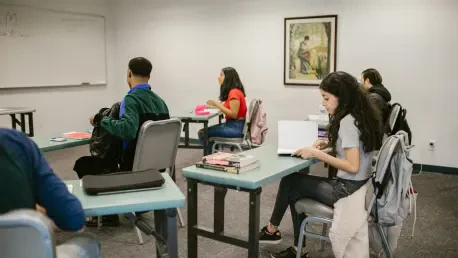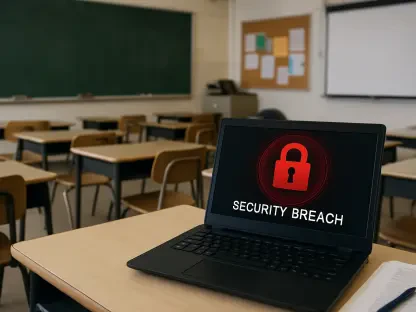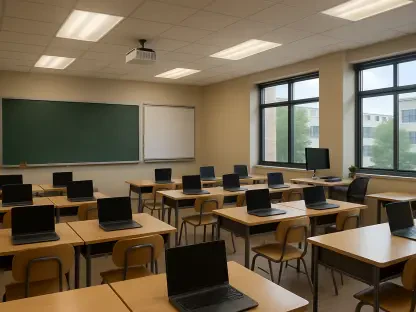In an era defined by complex global challenges, from escalating mental health struggles among young people to the lightning-fast evolution of technology, education emerges as a critical force for transformation, capable of reshaping how students engage with the world. Traditional schooling, often mired in outdated methodologies, frequently falls short in preparing students to confront these pressing issues with confidence and capability. Many leave the classroom feeling disconnected, lacking the tools or belief in their ability to influence their surroundings. Yet, a bold new perspective is gaining traction—one that reimagines education as a catalyst for empowerment, transforming students from passive recipients of information into active agents of change. This shift calls for a fundamental rethinking of how learning is structured, prioritizing relevance, autonomy, and impact over rote memorization. By exploring innovative approaches, this discussion delves into how education can equip young minds to reshape their personal lives, strengthen their communities, and contribute meaningfully to the world at large.
Rethinking the Role of Schooling
The foundation of modern education, built on systems that have remained largely unchanged for centuries, often emphasizes standardized testing and uniform curricula at the expense of real-world applicability. This rigid framework tends to sideline the diverse needs and aspirations of students, leaving many feeling irrelevant in a rapidly changing society. A mounting mental health crisis among youth, characterized by alarming rates of anxiety and depression, signals a profound disconnect. Schools, rather than merely serving as repositories of facts, must evolve into nurturing spaces where students recognize their worth and potential. This requires a deliberate pivot toward fostering environments that prioritize emotional well-being alongside academic growth, ensuring that every learner feels seen and valued. Addressing this crisis through education means creating opportunities for students to engage with challenges that resonate personally, sparking a sense of purpose that traditional metrics of success often fail to ignite.
Beyond the immediate need to tackle mental health, redefining education’s purpose involves aligning it with the demands of contemporary life. The current model, often criticized for its focus on memorization over critical thinking, leaves graduates unprepared for unpredictable career paths and societal shifts. A more dynamic approach would center on cultivating skills like adaptability and problem-solving, which are essential in navigating today’s complexities. Imagine a classroom where students are encouraged to question, innovate, and apply their learning to tangible issues—whether it’s addressing local environmental concerns or advocating for social equity. Such a system would not only bridge the gap between theory and practice but also instill a belief in students that their contributions matter. This transformative vision challenges educators and policymakers to dismantle outdated structures, replacing them with frameworks that empower rather than constrain the potential of young minds.
Fostering Autonomy in Learning
Central to transforming education is the concept of student agency, which emphasizes giving learners the freedom to shape their educational journeys. Unlike the conventional approach that enforces a standardized path for all, fostering autonomy means tailoring experiences to individual interests and strengths, allowing students to explore subjects and problems that ignite their curiosity. This shift moves the focus from achieving high grades or meeting external benchmarks to developing a deeper understanding of how one’s actions can create impact. For instance, projects that tackle community-specific issues, such as organizing food drives or creating awareness campaigns, enable students to see direct results of their efforts. By placing trust in students to take ownership of their learning, schools can nurture confidence and initiative, essential traits for becoming proactive changemakers in any sphere of life.
Moreover, empowering students through autonomy requires a cultural shift within educational institutions, where teachers transition from being sole authorities to facilitators of discovery. This approach encourages dialogue, critical inquiry, and collaboration, creating a learning environment that mirrors real-world problem-solving dynamics. When students are given the space to make decisions—whether choosing research topics or designing solutions to local challenges—they develop a sense of responsibility that transcends the classroom. Evidence from innovative programs worldwide shows that such methods lead to higher engagement and retention of knowledge, as learners connect emotionally and intellectually with their work. Redefining success through this lens means asking fundamental questions about impact and relevance, ensuring that education becomes a tool for personal and collective growth rather than a mere stepping stone to the next academic milestone.
Leveraging Technology for Progress
Technology, particularly artificial intelligence (AI), stands as a powerful ally in reimagining education for the modern age, offering tools to enhance learning and expand students’ capacity for impact. Far from being a disruptive force, AI can personalize education by adapting to individual learning paces and styles, providing resources that were once inaccessible to many. For example, virtual simulations and data analysis tools allow students to experiment with solutions to complex problems, from urban planning to climate change mitigation, in ways that are both practical and engaging. However, integrating technology into education must be approached with care, ensuring that it complements rather than overshadows human interaction and critical thinking. By embedding tech-focused curricula, schools can prepare students to thrive in an innovation-driven landscape, equipping them with skills to address future challenges creatively and effectively.
Equally important is the ethical dimension of technology use in education, as students must be guided to wield these tools responsibly. Without proper oversight, there’s a risk that tech could exacerbate inequalities or be misused in ways that harm rather than help. Educational systems should therefore prioritize teaching digital literacy alongside technical skills, emphasizing the importance of using AI and other advancements for societal good. Consider a scenario where students collaborate on projects that leverage AI to improve access to healthcare in underserved areas—this not only hones their technical abilities but also instills a sense of moral responsibility. Successful integration of technology hinges on balancing innovation with ethical considerations, ensuring that students view these tools as means to amplify positive change. This forward-thinking approach positions education as a bridge to a future where technology and humanity work hand in hand for progress.
Overcoming Barriers to Innovation
Transforming education into a platform for empowerment inevitably encounters resistance, as deeply entrenched systems are often reluctant to embrace change. Educators, administrators, and even parents may harbor skepticism toward new methodologies, fearing disruption or uncertain outcomes. This pushback is compounded by institutional inertia, where policies and practices remain tethered to historical norms despite evidence of their inefficacy. Yet, the urgency of modern challenges demands bold action, and clinging to outdated models risks further alienating students who need relevant skills to succeed. Breaking through these barriers requires persistent advocacy, demonstrating through data and dialogue that innovative approaches yield better engagement and long-term results. Change, though daunting, becomes achievable when stakeholders witness its tangible benefits in fostering student potential.
Inspiration can be drawn from numerous schools and districts that have successfully navigated these obstacles, implementing reforms like personalized learning plans and interdisciplinary projects with measurable success. These case studies reveal that resistance often diminishes when results speak for themselves—higher student motivation, improved problem-solving skills, and stronger community ties are hard to ignore. For instance, programs that allow students to design their own learning objectives have shown remarkable improvements in both academic performance and emotional well-being. Scaling such initiatives requires strategic planning, including professional development for teachers and transparent communication with communities to build trust. By highlighting these real-world examples, the path to systemic reform becomes clearer, proving that even the most stubborn barriers can be surmounted with determination and evidence-based strategies.
Building Impact from Small Beginnings
Empowering students to become agents of change doesn’t necessitate starting with grand, world-altering initiatives; often, the most profound transformations begin with modest, localized actions. Encouraging students to address issues within their immediate environments—such as improving school facilities or supporting peers facing challenges—can ignite a powerful sense of agency. These small-scale efforts serve as building blocks, reinforcing the idea that every contribution counts, no matter the scope. When a student sees the direct impact of organizing a recycling drive or mentoring a younger classmate, it cultivates a belief in their capacity to influence outcomes. This incremental approach not only boosts confidence but also lays the groundwork for tackling larger societal issues over time, creating a virtuous cycle of empowerment and action.
Furthermore, focusing on small beginnings aligns with the reality that systemic change often emerges from grassroots efforts, where individual actions inspire collective progress. Educational environments that celebrate these minor victories—through recognition or integration into curricula—help students internalize the value of perseverance and initiative. Imagine a scenario where a student-led project to reduce cafeteria waste evolves into a district-wide sustainability policy; such ripple effects demonstrate how localized impact can scale. Schools play a crucial role in facilitating these opportunities by providing resources, mentorship, and platforms for students to share their successes. By emphasizing that change starts close to home, education can demystify the concept of impact, making it accessible and achievable for every learner, regardless of background or ambition.
Shaping Tomorrow’s Problem-Solvers
Reflecting on the journey of educational reform, it’s evident that past efforts to empower students yielded significant insights into what worked and what needed adjustment. Schools that embraced student autonomy and integrated technology responsibly often saw remarkable shifts in engagement, as learners took ownership of their roles as changemakers. The focus on addressing mental health through purpose-driven learning also proved vital, helping countless young people rediscover their sense of value. Looking ahead, the next steps involve scaling these successes by advocating for policy changes that prioritize agency over outdated metrics. Collaborations between educators, tech innovators, and community leaders can further refine these models, ensuring they adapt to emerging needs. Ultimately, the vision of education as a transformative force must continue to evolve, equipping future generations with the tools and mindset to confront challenges with ingenuity and resolve.









